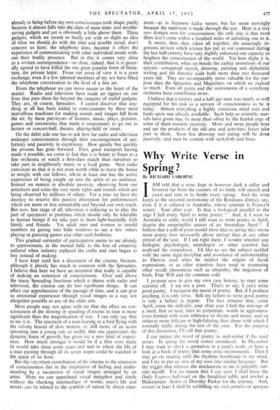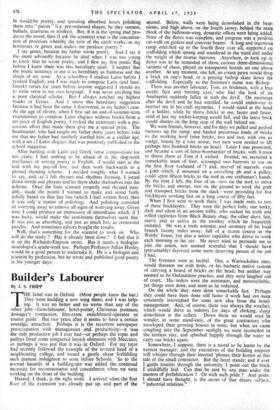Why Write Verse in Spring ?
ByRICHARD USBORNE
IAM told that a wine, kept in however dark a cellar and however far from the country of its birth, will stretch and yawn and turn in its bottle every spring. And the wine keeps to the seasonal metronome of the Bordeaux district, say, even if it is cellared in Australia, whose summer is France's winter. Year after year. Is that a biological parallel to the urge I feel every April to write poetry '? And, if I went to Australia to settle, would I still want to write poetry in April, despite the unspringlike season of an Australian April ? I believe that a poll of poets would show that in spring they wrote more poetry (not necessarily about spring) than at any other period of the year. If I am right there, I wonder whether any biologist, psychologist, neurologist or other scientist has analysed the compulsion. I'd like .to see the subject tackled with the same rigid discipline and avoidance of sentimentality as Darwin used when he studied .the origins of facial expressions, or as other scientists have used in examining other occult phenomena such as telepathy, the migration of birds, Free Will and the common cold.
I propose now to give my own case history, to start some scientist off. I am not a poet. That's to say, I can't write good poetry. I recognise the mood of poetry. But, if I produce anything, it is only verse. Still my failure to write good poetry is only a failure in degree. The fact remains that, come April, come the daffodils, year after year I feel the stirrings of a need, first to read, later to perpetrate, words in agglomera- tions formed with some reference to rhyme and metre, and on subjects more delicate or high-faluting than those with which I normally traffic during the rest of the year. For the purpose of this discussion, I'll call that poetry.
I can induce the mood of poetry in mid-winter if the need arises. In spring the mood comes uninduced. In December I may want to check a quotation in a poet's work, or have a look at a book of poetry that some critic recommends. Then I may go on reading until the rhythms bombinate in my mind, and I try to put an idea of my own into similar language. But the trigger that releases the mechanism in me is palpably out- side myself. For no reason that I can spot, I shall leave the Daily Express half-read on the breakfast table, and pocket a Shakespeare Arden or Dorothy Parker for the journey. And, sooner or later I shall be scribbling my own pensees or apercus in would-be poetry, and spending absorbed hours polishing them into " pieces " (i.e. pre-ordained shapes, be they sonnets, ballads, quatrains or triolets). But, if it is the spring that pro- duces the mood, then (I ask the scientist) what is the concatena- tion of processes whereby the turn of the earth works on my hormones or genes and makes me 'produce poetry ?
I say genes, because my father wrote poetry. And I say it the more advisedly because he died when I was too young to know that he wrote poetry, and I flew my first poetic flag before I knew there was this hereditary taint. I suspect that the poetic tendency in me is as hereditary as baldness and the shape of my nose. As a schoolboy I studied Latin before I studied English, and I was made to compose Latin (and later, Greek) verses for years before anyone suggested I should try to write verse in my own language. I was never anything but a poor classical scholar. But I always notched my highest marks in Verses. And I stress this hereditary suggestion because it had been the same, I discovered, in my father's case. At the age of eleven, when I first sat an end-of-summer-term examination to compose Latin elegiacs without books from a set piece of English poetry, I rocked the examiners with a pre- cocious effort that made them give me a special prize. The headmaster, who had taught my father thirty years before, told me that my father had similarly startled him, at a similar age, with a set cf Latin elegiacs that was positively published in the school magazine.
After battling with Latin and Greek verse compositions for ten years, I had nothing to be afraid of in the slog-work mechanics of writing poetry in English. I would start at the end with my pay-off line, and then work backwards to a plotted rhyming scheme. 1 decided roughly what I wanted to say, and, as I felt rhymes and rhythms forming, I jotted down words and phrases and let them shake themselves into the scheme. Once the lines scanned properly and rhymed pass- ably, made the points I wanted to make and stood fairly solidly based on that last line (which I had written first), then it was only a matter of polishing. And polishing consisted of worrying away to remove all signs of worrying away. Given time I could produce an impression of smoothness which, if I was lucky, would make the sentiments themselves seem fine. It was just as absorbing, and just as much fun, as crossword puzzles. And sometimes editors bought the results. Well, that's something for the scientist to work on. Who will do the study ? Has it already been done ? I feel that it is up the Richards-Empson street. But it needs a biologist- neurologist's spade-work too. Perhaps Professor Julian Huxley would be a good person to undertake it. He is a biologist and scientist by profession, but he wrote and published good poetry in his younger days.



































 Previous page
Previous page